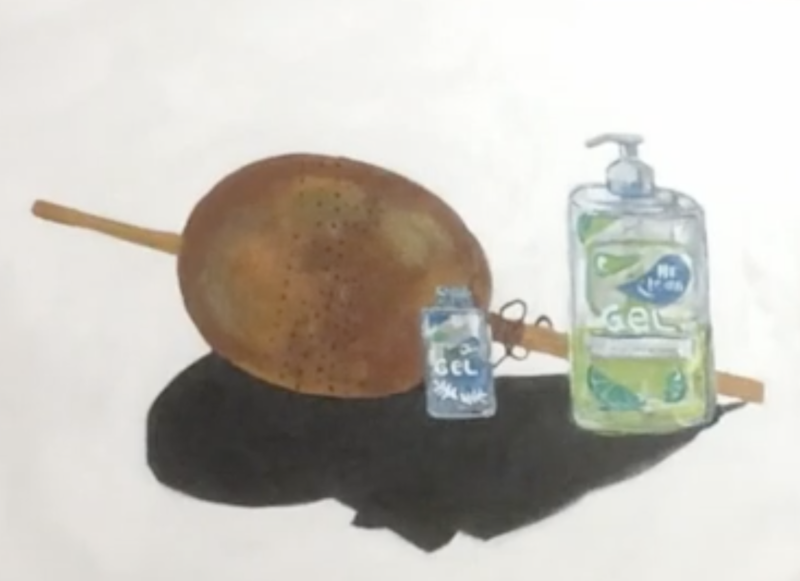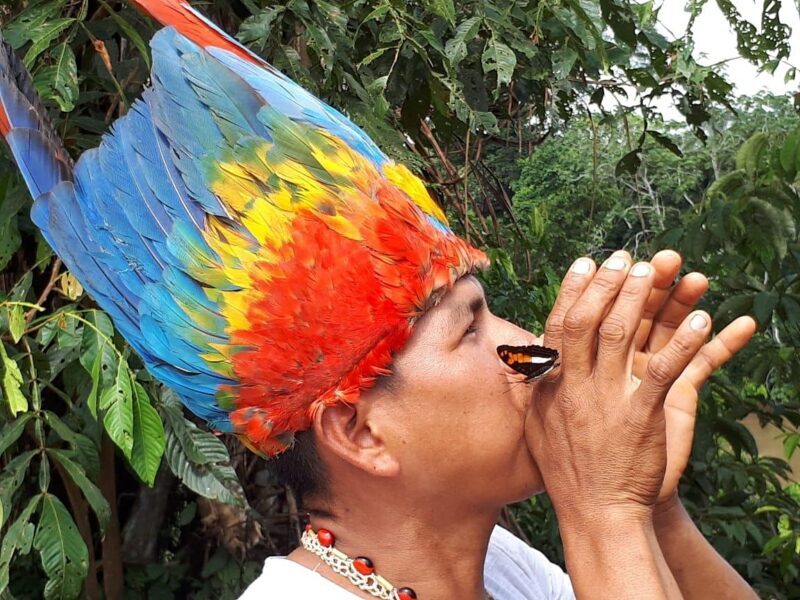“Our dream is to maintain, protect and conserve this area for many years to come… It’s the only green area we have that purifies the air of the constant contamination from oil operations… Our resistance is tireless, non-negotiable… We want peace and tranquility. Let us live in our own way.”
-Eduardo Mendúa, 1982-2023
Cofan People, Ecuador
Portrait of murdered Indigenous forest defender Eduardo Mendúa by Vilma Vargas, 2023
___
___
On February 26, 2023, Eduardo Mendúa, an Indigenous forest defender who was fighting to protect Ecuador’s Amazon rainforest from oil extraction, was murdered at his home by gunmen. Mendúa, the director of international relations for CONAIE, the Confederation of Indigenous Nationalities of Ecuador, and a member of the Cofan People, was part of a group who have been blocking the state-owned oil company, PetroEcuador, from expanding its oil extraction operations on forested Cofan lands. His murderers have not been apprehended but there is no doubt that he was assassinated due to his vocal and courageous resistance to oil extractivism.
ONCA is honoured to show new work by Ecuadorian artist Vilma Vargas in the window gallery. Vargas’ political cartoon portrait of Eduardo Mendúa serves to remind audiences of the ongoing atrocities faced by Indigenous people on multiple fronts, due to colonial extractivist industries.
The Confederation of Indigenous Nationalities of Ecuador, CONAIE is an organisation with historical and international prominence that brings together the Indigenous Nationalities, Peoples, communities, Centres and Associations of Ecuador. The work they have undertaken protecting their territories is invaluable in the global fight for social and climate justice. To show material support and solidarity with CONAIE please donate here.
Resistance to extractivism continues across multiple fronts
The horrific murder of Eduardo Mendúa is part of a long war against Indigenous and frontline environmental and human rights defenders systematically oppressed for standing up to mining, logging and fossil fuel extraction on their ancestral lands across the world. In a continuation of historic patterns of coercive extractivist violence, on a daily basis Indigenous Peoples continue to be criminalized, intimidated, displaced, brutalised and murdered for defending their homes-territories and ancestral practices.
This systemic violence amounts to a centuries-long struggle and resistance against a globalized model of development where corporate and state powers seek economic growth at the costs of the commodification and exploitation of all forms of life. Indigenous Peoples have been and continue to be at the forefront of protecting and defending life on Earth with spirit and flesh. Their ancestral knowledge, wisdom, and profound connection with Mother Nature is crucial for humanity’s endeavour to safeguard the future of our planet.
About Vilma Vargas
Vilma Vargas is a popular Ecuador-based illustrator and political cartoonist. She participated in the Graphic Humor Exhibition at the University of Alcalá in 2006, in the International Exhibition of “Women and the Art of Caricature” in 2007 and in the World Press Cartoon contest 2010. She illustrated the first Ecuadorian edition of Don Quixote in 2005, and Ecuadorian postage stamps in 2015. Awards include the 2019 “Humour of the Americas Award” in Mexico; the RESET 11.11.11 Award in Puebla-Mexico; the CITMA award at the “Bienal de Humorismo Grafico de Cuba” in 2006; Honorable Mention at the “Comic and Cartoon for Peace” contest in Quito, 2000.
In 2015, intruders entered Vilma’s home, stealing nothing, but damaging drawings and paintings and throwing them on the floor. The following year the Núcleo de Azuay House of Ecuadorian Culture censored Vilma’s works and writing for the HUARMIcaturas For Freedom exhibition. In October 2016, Vargas carried out an artistic project thanks to a grant from the ARTIST PROTECTION FUND in Pittsburgh, USA.
Other stories from around the world
ONCA has been honoured to support the work of artists and communities in many parts of the world and to witness some of the reciprocal webs of solidarity that extend between communities of care across the global south and north. Here are some important stories that ONCA has explored. These struggles are all ongoing; the following links are brought together below to offer ways to learn about the artists’ work and the challenges faced by their communities.
Other commentary on Indigenous and Black-led environmentalism
We have hosted a number of artist-teachers and scholar-activists exploring Black, Indigenous-led and decolonial activism and world-building. Our archive of recordings of these events is viewable on YouTube, presented by, amongst many others:
- Joshua Virasami in conversation with TJ Demos and Maddy Ryle
- Wretched of the Earth
- Suzanne Dhaliwal in conversation with Sadiah Qureshi and Audra Mitchell
- Imani Mason Jordan curating works by Matice Moore, Laurèl Hadleigh & Tsai Tung Li
- Ama Josephine Budge
- Leny Olivera Rojas, TerraJusta
- Walidah Imarisha
- Fleur Ramsey in conversation with Camille Barton and Daz Chandler
- Jennifer Uchendu in conversation with Beverly Naidus and Sarah Jaquette Ray
- Adam Elliott-Cooper
- Tara Mariwany
- Susuana Amoah
- Jacob V Joyce

BRAZIL:
ONCA has shown works by a number of indigenous Brazilian artists including Denilson Baniwa, Jaider Esbell and Edgar Kanayko Xakriaba in the gallery and online. We have participated in international projects of solidarity and artist support including Um Outro Ceu and Cultures of Anti-Racism in Latin America (CARLA). The following links are brought together here to offer ways to access their works and learn about the artists’ work and the challenges faced by their communities.
After the CARLA conference at University of Manchester, which showcased ways in which artists in Argentina, Brazil and Colombia address racial diversity and use their art to challenge racism and deeply entrenched racial inequality, Indigenous Brazilian artist Arissana Pataxo and scholar Felipe Milanez spoke at an event co-hosted by ONCA and University of Sussex. This is the transcript of Felipe’s talk, in which he discusses resistance to Bolsonaro, corruption, COVID, genocidal intent and action against Indigenous people, movement building, art and the role of Indigenous artists in the contemporary movement for social and ecological renewal and re-imagining.

CAMBODIA:
These connections with Brazil emerged through ONCA’s partnership work on the Atmospheres of Violence research project led by Dr Mary Menton, in which the resistance and creative practice of frontline communities in Brazil, Cambodia and Bangladesh was celebrated through an art exhibition, whilst the multiple forms of violence they face were explored and documented. Later, Claudelice Santos from the Zé Claudio and Maria Institute (Brazil), activists from the Cambodian Youth Network and campaigners from sites of resistance along the route of the HS2 railway in England came to speak and share their films at Atmospheres of Resistance, a COP26 Fringe event co-hosted by ONCA and Not One More.

COLOMBIA:
Peoples such as the Yukpas in Colombia have a unique and long trajectory of resistance to the activities of corporations with headquarters in London promoting extractivism in the Global South, violating human and ecological rights. Their first hand experience is invaluable in the struggle for justice through strategic litigation, yet often they face severe threats and difficulties for resisting transnational corporations. The Resisting Killer Corporations talk and workshop, hosted by Colombian youth justice advocate Helena Müllenbach Martinez and University of Sussex’s Centre for Global Political Economy, featured inspirational movement leaders including Gilberto Torres and Sebastian Ordoñez Muñoz exploring the strategic use of litigation and international solidarity to amplify anti-extractivist struggle.

ECUADOR:
ONCA hosted the premier of the film Sacha Taki (Songs of the Forest) made by members of the Pueblo Ancestral Kichwa Kawsak Sacha (PAKKS) forest community in Ecuador, in collaboration with international researchers including Sussex Humanities Lab’s Experimental Ecologies initiative. The film explores the PAKKS’ transcendental ecological forest sound-centred cosmovision. The event featured a panel discussion with PAKKS community representatives, translated by Kichwa environmental justice activist Paccha Turner Chuji.

BOLIVIA:
ONCA is a long-term supporter of Comunidad Inti Wara Yassi, founded by Nena Baltazar, a series of reserves in the Bolivian Amazon dedicated to the rescue, rehabilitation and care of illegally trafficked wild animals and birds.

PAKISTAN:
As part of a series of events raising funds for Women Democratic Front in Pakistan after the catastrophic flooding in autumn 2023, ONCA and Nichola Khan Director of Brighton University’s Centre for Spatial, Environmental and Cultural Politics co-hosted a panel discussion exploring the systemic drivers of climate change and socio-economic injustice in Pakistan.

INDONESIA:
In collaboration with the WEGO network of researchers into feminist political ecologies, ONCA hosted Extracting Us, an exhibition on feminism, politics and coal extraction which sought to ‘look differently’ at the politics of coal extraction, taking an intersectional approach and bringing together feminism, ecology, climate change and politics. Following on from this gallery exhibition, the network co-curated a larger online exhibition of works from artists and scholar-activists working in a range of front-line contexts in Brazil, Tajikistan, Northern Ireland, Papua and elsewhere. The latest iteration of the project, Despite Extractivism, is viewable online.

BORNEO:
ONCA has collaborated twice with Bornean artist Deru Anding whose large black and white ink drawings evoke in detail the forest and community where he grew up. Deru now lives and works as an architect and artist in London, but he was born and raised amongst the Bidayuh Tribe in the jungle of northwest Borneo. Over the past two decades, 75% of Deru’s homeland has been destroyed for palm oil plantations, logging, and other developments. Generations, our first exhibition of Deru’s works, curated by Susuana Amoah, was held alongside talks and workshops that explored intergenerational and transnational justice including an evening with members of Wretched of the Earth.
The next time we showed Deru’s works was as part of Beyond Ruin, a group exhibition for Lost Species Day 2020 in which they were exhibited alongside works by artists Felipe Jacome from Ecuador and Denilson Baniwa from Brazil, as well as the UK.
—
Share on Twitter /
Share on Facebook
Posted on March 23, 2023
Categories: Online Gallery
Tags: Atmospheres of Resistance, Atmospheres of Violence, Brazil, CIWY, Colombia, Deru Anding, Ecuador, Eduardo Mendúa, Extracting Us, Pakistan, WEGO
→ Earth Day on the Southeast Coast
← We’re hiring! ONCA needs a new Gallery Manager
